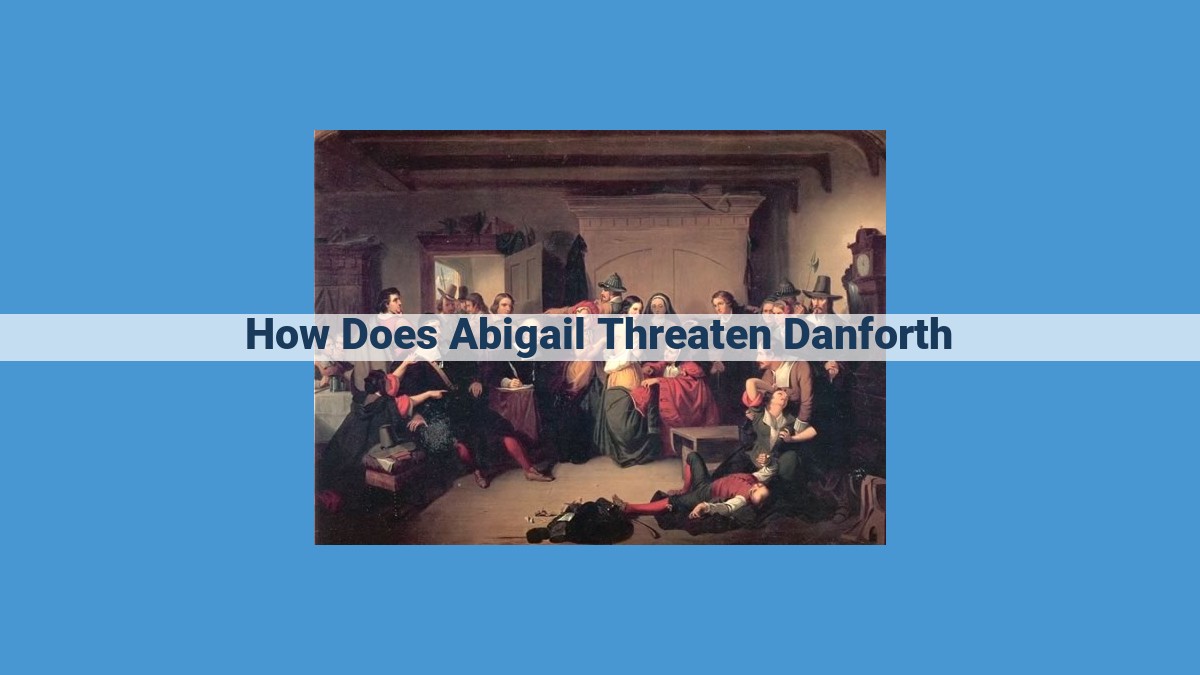Abigail’s accusations threaten Danforth by jeopardizing his reputation and the town’s trust, fueling fear and superstition, casting doubt on the girls’ credibility, and presenting a moral dilemma. She accuses Danforth of being in league with the devil, which could damage his honor and authority. The accusations also create a climate of hysteria, making it difficult for Danforth to uphold justice. Additionally, Danforth questions the girls’ motives and experiences, raising concerns about their reliability. Lastly, he faces a moral crossroads, weighing the potential for wrongful executions against upholding the law.
Danforth’s Reputation in Jeopardy
In Arthur Miller’s play “The Crucible,” Judge Thomas Danforth, a respected figure within the Puritan community of Salem, faces a crisis of reputation as Abigail Williams’s accusations of witchcraft cast a shadow over his integrity and authority. Abigail’s accusations not only threaten the lives of innocent individuals but also jeopardize Danforth’s position as a fair and judicious magistrate.
If the town were to succumb to Abigail’s fabrications, Danforth’s reputation would be irrevocably tarnished. His once-respected name would become synonymous with injustice, and his ability to lead the community would be severely compromised. The fallout would extend beyond mere gossip; Danforth’s credibility, the foundation upon which his authority rested, would crumble.
Witchcraft’s Darkening Shadow: How Abigail’s Accusations Poison a Puritan Town
Abigail Williams’ venomous accusations cast a sinister spell over the Puritan community of Salem, Massachusetts. Like wildfire, her claims of witchcraft spread terror and suspicion, enveloping the town in a suffocating cloak of fear.
The atmosphere of mass hysteria that gripped Salem made upholding justice a perilous task for Judge Danforth. As accusations flew thick and fast, he found himself torn between his duty to protect the innocent and the growing pressure to quell the rising tide of superstition. The cries of “witchcraft” reverberated through the streets, transforming whispers into deadly accusations.
Abigail’s accusations ignited a deep-seated fear within the community. The specter of witchcraft, once relegated to mere folklore, now loomed over Salem as a tangible threat. Fear and mistrust spread like a contagion, pitting neighbor against neighbor as accusations piled up. The very fabric of the community seemed to unravel before Danforth’s eyes, torn apart by the relentless scourge of suspicion and fear.
**Questioning the Girls’ Credibility: Danforth’s Dilemma**
In the midst of the Salem witch trials, Deputy Governor Danforth faced a daunting task: determining the truth amidst a torrent of supernatural accusations. Abigail Williams, the prime instigator, claimed to witness numerous specters terrorizing the town. Yet, Danforth’s legal acumen prompted him to scrutinize her testimony with a skeptical eye.
Danforth recognized that subjective experiences could easily be misinterpreted or influenced by fear. The girls’ claims of seeing spirits and being afflicted by witchcraft lacked concrete evidence. Moreover, he suspected that their biases against certain individuals might have clouded their perceptions. For instance, Abigail’s grudge against John Proctor cast doubt on her credibility.
Furthermore, Danforth delved into Abigail’s past, uncovering fabricated accusations. She had previously accused a neighbor of witchcraft out of spite. This revelation raised red flags, indicating that her current claims could be equally malicious. Danforth questioned her intent, wondering if her desire for power or revenge was driving her allegations.
As Danforth weighed the girls’ credibility, he was torn between upholding the law and protecting innocent lives. He understood that condemning individuals based on flimsy evidence could lead to wrongful executions. Yet, dismissing the accusations altogether could embolden the accusers and further fuel the hysteria that gripped Salem.
Danforth’s dilemma highlighted the complexities of the witch trials. In an atmosphere permeated by fear and superstition, it became increasingly challenging to discern truth from deceit. The girls’ subjective experiences, potential biases, and past fabrications cast a long shadow over their credibility, leaving Danforth to grapple with an agonizing moral choice.
Danforth’s Moral Crossroads in “The Crucible”
Moral Dilemma
Judge Danforth finds himself at a moral crossroads as he attempts to navigate the complexities of the Salem witch trials. His unwavering belief in the law and the Puritan values of justice and fairness collides with the terrifying accusations of witchcraft that have gripped the town. Torn between his duty to uphold the law and the potential for wrongful executions, Danforth is forced to confront the dark underbelly of human nature.
Consequences of Believing Abigail’s Accusations
If Danforth were to heed Abigail Williams’ malicious accusations, the consequences would be dire. Innocent lives would be ruthlessly extinguished, fueling the fire of superstition and fear that has spread throughout Salem. The town would be stained with the blood of the innocent, leaving an indelible mark on its history and eroding its foundation of justice.
Risk of Dismissing the Accusations
On the other hand, if Danforth dismisses the accusations outright, he risks undermining his reputation and authority as a respected judge. His credibility would be shattered, and the town’s trust in the legal system would be shaken. The accusations would spread like wildfire, casting a shadow of doubt over the entire community and potentially leading to a breakdown of order.
